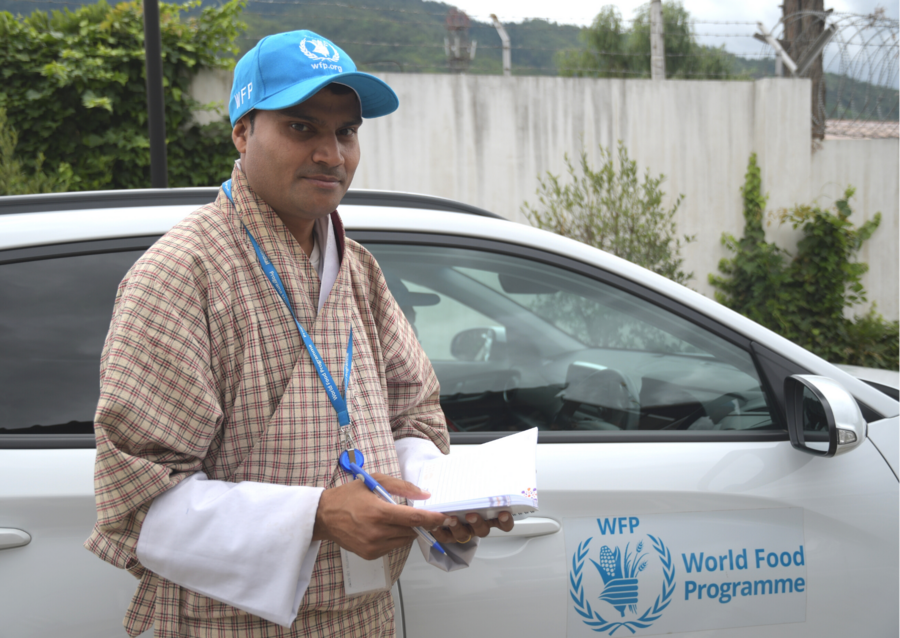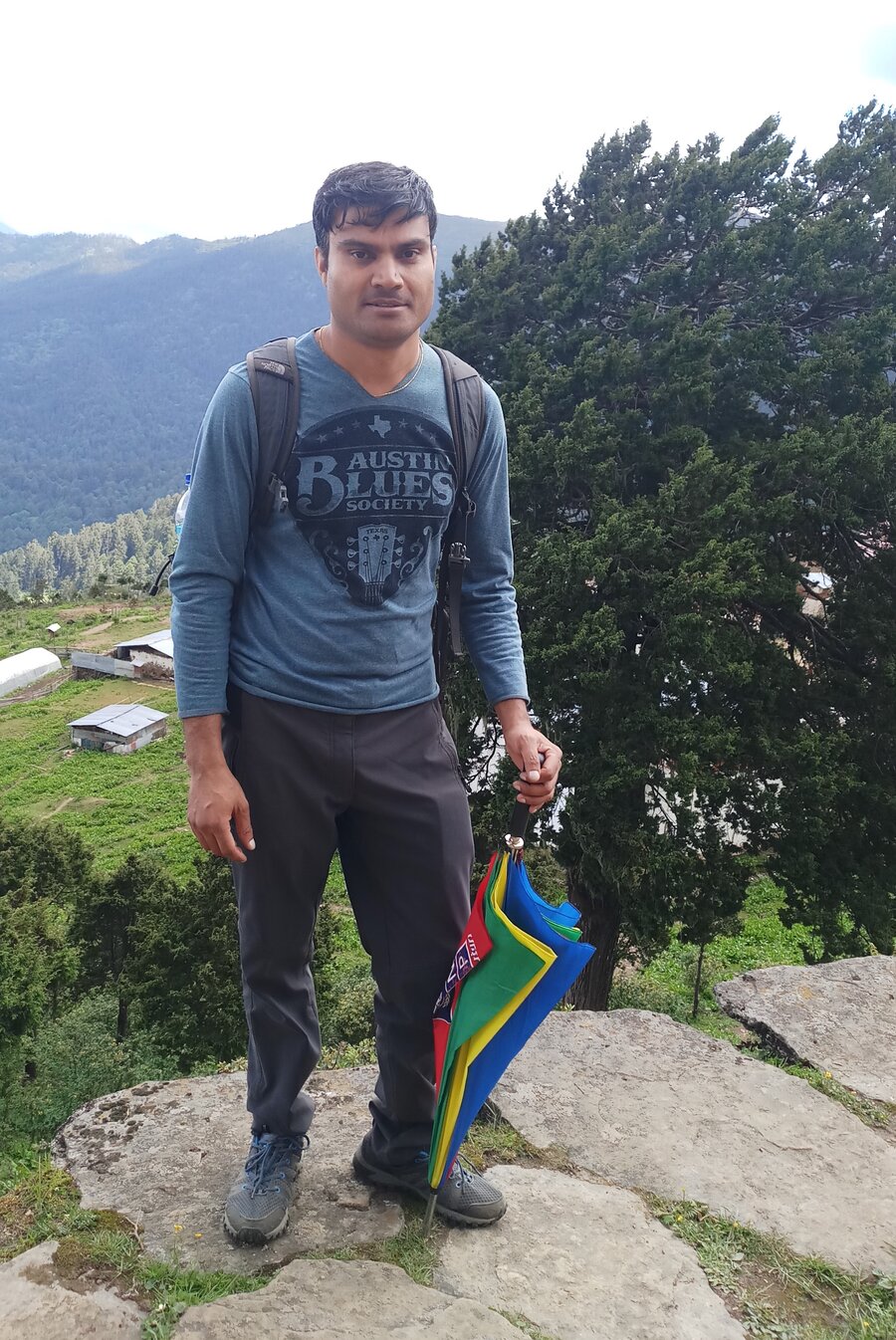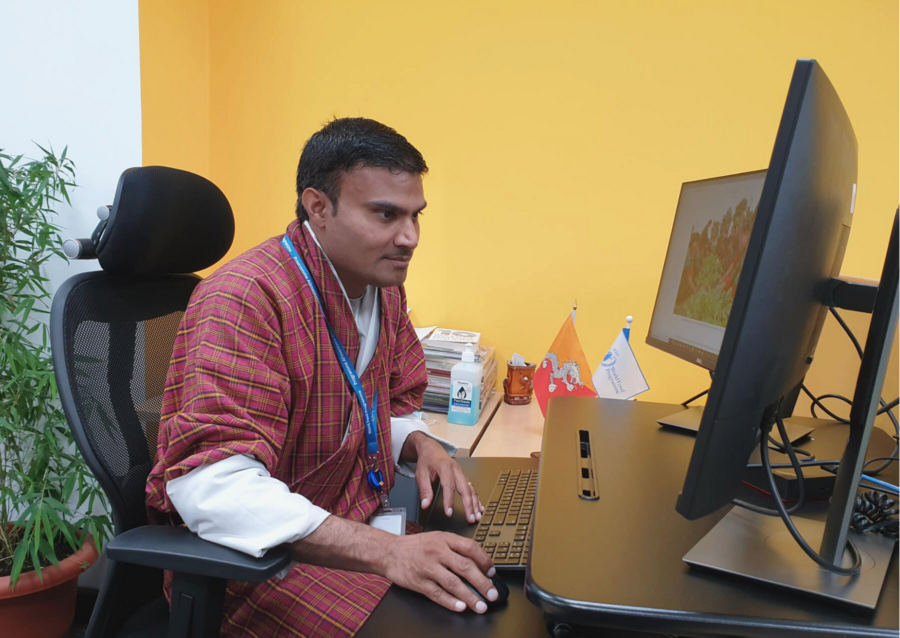WFP, my work and me…Udaya Sharma
When Udaya Sharma joined WFP 14 years ago, he began monitoring the impact of school meals that he himself had received as a child growing up in Bhutan. In recent years, his focus has shifted to innovation, helping develop tools including the award-winning PLUS School Menus, and the School Health and Nutrition Monitoring & Reporting System, which is being used across all of Bhutan’s 650 schools.

Who has inspired you most in your life?
My father is a Hindu pandit [priest], who follows very strict principles. This has helped me to also live my life in a disciplined, principled way.
What are your main memories from growing up as a child?
As there were no schools within walking distance from my home, I attended boarding schools where there was a [WFP] School Feeding Programme. The school playground was one of the most memorable parts of my childhood. When I was in the playground, I would forget everything that happened in the classroom and would just play football, throw darts and run races. Friendships, bonds and alliances were formed in that precious outdoor free play time. Even today, when I meet those old friends, we recall those moments and we talk about them for hours.
What is the best decision you ever made?
The best decision of my life was joining WFP. I can see how we bring real change to the lives of the people we are serving. During missions to monitor school programmes, I would recall my own days as a school boarder looking forward to warm school meals every day. My personal experience helped me understand the challenges and situations of rural Bhutanese people.
Which piece of advice has proved the most valuable to you?
‘Learn how to talk business’ is the best advice I have received, from my current Country Director, Svante Helms. Being able to communicate what I do in simple, non-technical language is critical for others to understand. His advice has helped me to focus more on my communication skills and on communicating to others.

Where in the world would you most like to live?
Here in Bhutan. Bhutanese culture is very socially aware, helping families and communities. The culture of helping each other is strong, whether it’s financially or emotionally. We help people who suffer. But if I had the opportunity to work for a short while somewhere, I would pick Spain. It looks like a beautiful country, and I have friends from there who I’ve met in workshops.
Why do you do the work you do?
One the many reasons is that I have a passion for harnessing technology to find simple solutions to complex, real-world problems. I'm an IT graduate, and have always found myself mulling over the questions: “How can we make this easier? How can we make this simpler?" The Royal Government of Bhutan used to collect national information on the country’s health and nutritional status manually, using paper and pens, and speaking to people individually. I introduced a digitized School Health and Nutrition Monitoring & Reporting System in 2019, which is now being used across Bhutan’s 650 schools in all 20 districts.
With PLUS School Menus, we tried to address three principles for a good menu: it should be cost-effective, nutritious and use local ingredients as much as possible. I worked with the WFP Innovation Team on an algorithm that calculates nutritious menus using locally sourced food and seasonal ingredients, according to location and needs. In 2019, with country office colleagues, we conducted the world’s first PLUS School Menu pilot in Punakha district. The menu was cheaper, more local produce was used and local government staff needed just two hours to learn the system.
How do you like to relax when you’re not working?
Usually during the weekends, I go for a hike either with friends or family. I enjoy exploring the beautiful mountains, monasteries, rivers and streams all around Thimphu [capital of Bhutan]. The fresh air and sun, walking and up-close exposure to natural features such as streams, forests and mountains, helps to compensate for many of the physical and mental stresses of the work week. I also enjoy taking my kids to parks and playing with them!

When have you felt your happiest?
When I can see how we bring real change to the lives of people we are serving. When travelling through Bhutan, I remember that in winter parents would say that they didn’t want schools to close as children would miss out on food. In fact, in rural areas, where people's homes were often very far from the closest school, they would set up fragile huts near the school with hastily constructed roofs and improvised bedding. After I saw these, I made recommendations for building proper hostels for these children, and was part of the team that wrote the proposals and built the dorms. Going back and seeing the kids studying, eating and living in the hostels gives me an amazing feeling.
PLUS School Menus won the WFP Innovation Challenge Award in 2018, and the iGlobal Best Practices Award at the World Expo Dubai in 2020, in the category “Water, Food and Energy Security".
